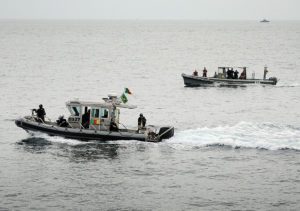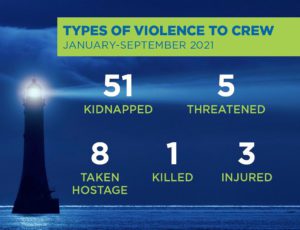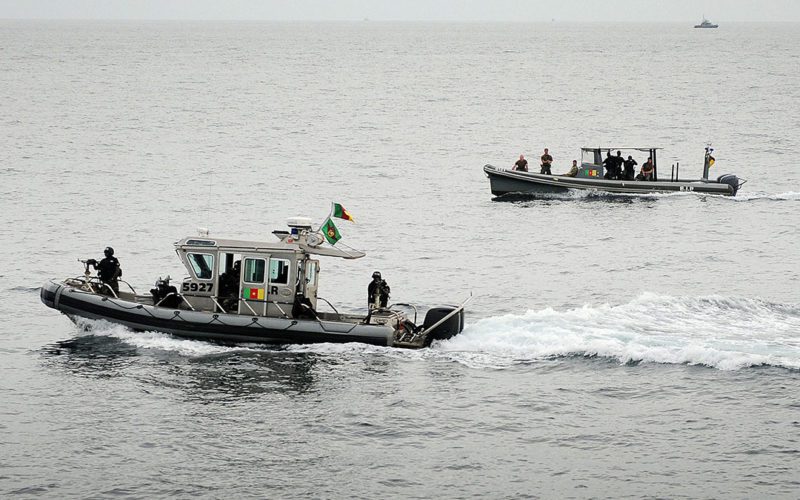
Reports of piracy and armed robbery against shipping fell sharply during the first nine months of 2021, but authorities warn the slowdown might not be permanent.
During that nine-month period, the International Chamber of Commerce’s International Maritime Bureau (IMB) received the fewest reported incidents of piracy and armed robbery against ships for any nine months since 1994. Mariners reported 90 such incidents as of Sept. 30, down 35 percent from the same period in 2020.
IMB Director Michael Howlett attributes much of the overall decline to fewer incidents in Africa’s Gulf of Guinea, which has been a piracy hotspot. “We think this is due to the fact that there is a spotlight on the region,” he said.

Piracy in the Gulf of Guinea evolved from a violent political insurgency in Nigeria’s Niger Delta region. Utilizing knowledge of seafaring industries and local geography, militants morphed into pirates and made a business out of kidnapping crews for ransom. The crisis mirrored the rise of Somali pirates more than a decade earlier.
In 2020, a record 130 crewmembers were kidnapped in the Gulf of Guinea. Most attackers carried guns. But in the first three quarters of 2021, the number of crew subjected to kidnapping in the Gulf of Guinea dropped to 58.
Piracy incidents of any kind in the Gulf of Guinea were down. Twenty-nine occurred in the first nine months of 2021. During the same stretch in 2018, 2019 and 2020 there were an average of almost 51 incidents in the Gulf of Guinea.
Naval forces, industry and maritime groups are taking the pirate threat seriously, Howlett said, resulting in the Gulf of Guinea Maritime Collaboration Forum. The group formed last spring.
“We’re involved as well,” he said, “and it’s really just trying to work out where the issues are and what needs be done to resolve it.”
“Not only does it need to be supported,” he added, “it needs to be sustained.”
Dirk Siebels, a senior analyst at Risk Intelligence, a Danish security company, is watching developments in the Gulf of Guinea cautiously.
“It’s been very quiet this year, but [there have] been very calm months in the same period in previous years as well, so … this is not a unique situation,” Siebels told Professional Mariner. “There are counter-piracy efforts ongoing in the Gulf of Guinea, but it’s much too early to assess whether the efforts that have been stepped up this year already had an impact.”
“The overall threat level remains significant,” he warned. “There are still a lot of security issues in the Niger Delta and it will be important to look at the situation in the coming months.”
Instances of violence against crews by pirates also diminished, according to the IMB reporting. For the first nine months of 2018, there were 164 cases of violence, including hostage taking, kidnapping, threats, assaults, injuries and murders. That number shrunk to 133 in the nine months of 2019 and was 134 during the same time in 2020. In the first nine months of 2021, there were 70 incidents that involved violence against crews.
Despite the overall rosier picture, the IMB highlighted three other regions where piracy is rising. The Singapore Straits recorded 20 incidents in the first nine months of 2021, up from 15 during the same period in 2020. These are mostly opportunistic threats — thieves seeking equipment and objects to steal — but in 10 incidents the robbers carried knives and in one, the perpetrator reportedly had a gun.
Incidents are also on the rise in Callao Anchorage, Peru, with 15 in 2021, including five that involved violence against a crewmember. Lastly, there were eight incidents in Manila Bay, Philippines.
As for the larger trend — the fact that the first nine months of 2021 were the quietest in 27 years — Howlett said he can’t account for it. It may be due to inconsistent reporting in the early years of the IMB’s piracy tracking, which began in 1991.
The most significant takeaway, he said, was that the Gulf of Guinea threat can be further diminished through pressure on governments and collaboration between industry groups.
“That’s where the real risk to the seafarers is,” said Howlett, “so if we can … keep the spotlight on it, that could create the political will.”

